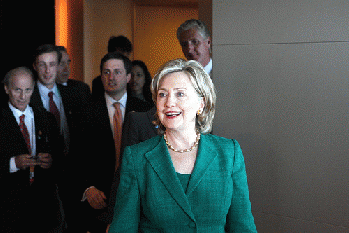by Walter Brasch
Hillary Rodham Clinton limped into the Democratic National Convention with enough pledged delegates to claim the Democrats' nomination for the presidency and enough hubris that forced her and her senior advisors to spend time and resources dealing with her own party rather than targeting Donald Trump.
She had emerged from numerous Congressional hearings about Benghazi and the e-mail scandals with minimal or no culpability, but was sprayed by maximum venom by Trump, other Republican nominees for the presidency, and almost every conservative in the country who regularly watches Fox News and listens to partisan talk radio.
Numerous polls had revealed about 58 percent of voters disliked both Clinton and Trump, with the numbers of voters favoring each of them trending downward.
The Republican convention had been marked by a sharp division among Trump, Tea Party favorite Sen. Ted Cruz (R-Texas), and moderates who didn't like either of the last two remaining Republicans for their party's nomination. Many of Cruz's both ardent supporters were thinking about voting for Gary Johnson of the Libertarian party.
The Democratic convention, which closed this past Thursday, was also marred by a major split. Clinton--a child and social justice advocate, First Lady, U.S. senator, and secretary of state--is seen as more conservative and less trustworthy than Sen. Bernie Sanders (I-Vt.), a Democratic Socialist who has led a major revolt against establishment politics and policies. During the primaries, he accumulated about 12 million votes and 1,894 delegates to Clinton's 16 million votes and 2,807 delegates. For much of the campaign, while Sanders was drawing as many as 20,000 to his rallies, and was broadening his appeal to those who wanted to follow his leadership on liberal issues, the national media gave him significantly less coverage than they gave to the Tweeting Trump.
Three days before the convention, Clinton, who would become the nation's first female candidate from a major political party, announced that Sen. Tim Kaine (D-Va.), who had been chair of the Democratic National Committee, 2009--2011, was her choice as vice-president, angering the Sanders' supporters who saw Kaine as representing the established Democratic leadership.
On the Sunday afternoon before the convention, a protest and a resignation furthered the division. The protest was carried out by more than 10,000 anti-fracking activists who marched a mile from City Hall to Independence Hall; the march was barely covered by the major national media. Clinton favors fracking as one part of an "all of the above" approach to energy exploration and delivery. Sanders is adamant there should be a ban on fracking and a greater push for renewable energy.
The DNC platform committee closed some of the division between Sanders and Clinton's supporters by accepting or modifying some of what Sanders and his 12 million voters were fighting for, including a federal minimum living wage of $15 an hour, plans to break up large Wall Street banks, free tuition for most students attending public colleges, and several policies that would protect the environment and enhance medical coverage for citizens.
The resignation was from Rep. Debbie Wasserman Schultz (D-Fla.), the DNC chair who was caught in an e-mail scandal of her own. Among thousands of internal e-mails among Democratic politicians and senior staffers that were hacked, and then posted on Wikileaks, were those that had revealed a partisan campaign by DNC officials to discredit Sanders and to support Clinton. The release of the e-mails occurred three days earlier. The FBI said that cyber-tech experts hired by the DNC believed the hacking was done by Russians who preferred to deal with a Trump presidency.
Trump, on the third night of the Democrats' convention, grabbed the media spotlight by suggesting Russia could hack into DNC and Clinton e-mails and make them available to the American citizens. A senior campaign aide hours later said Trump was being sarcastic.
Trump's campaign staff had choreographed much of the Republican convention. Seeking to unify the party, they gave Cruz a speaking slot on the third night. Cruz, who was expected to endorse Trump, listened to his followers, spoke about Republican issues, did not endorse Trump, and told the 2,472 delegates they, and the nation's Republican voters, should "vote your conscience." There was only one day to counter the stinging rebuke by a large segment of the party that was divided before and during the convention, and is likely to remain divided for at least the next three months.
The Democrats had learned a lesson. The liberal wing of a liberal party got prime-time speaking slots the first day of the convention. If there was any problem, it could be addressed the next three days and, hopefully, forgotten by Friday.
Addressing the delegates during the prime-time first night, which carried the theme of "Unite Together," were Michelle Obama, Sens. Cory Booker (D-N.J.), Elizabeth Warren (D-Mass.), and Al Franken (D-Minn.), all of whom enthusiastically praised Clinton, all of whom attacked Donald Trump, but didn't mention his name. Sanders, who had previously endorsed Clinton and spoke on her behalf the first night of the convention, had angered many of his followers who wanted him to defect to an independent race or, at the least, support Jill Stein, the Green Party's nominee.
(Note: You can view every article as one long page if you sign up as an Advocate Member, or higher).





